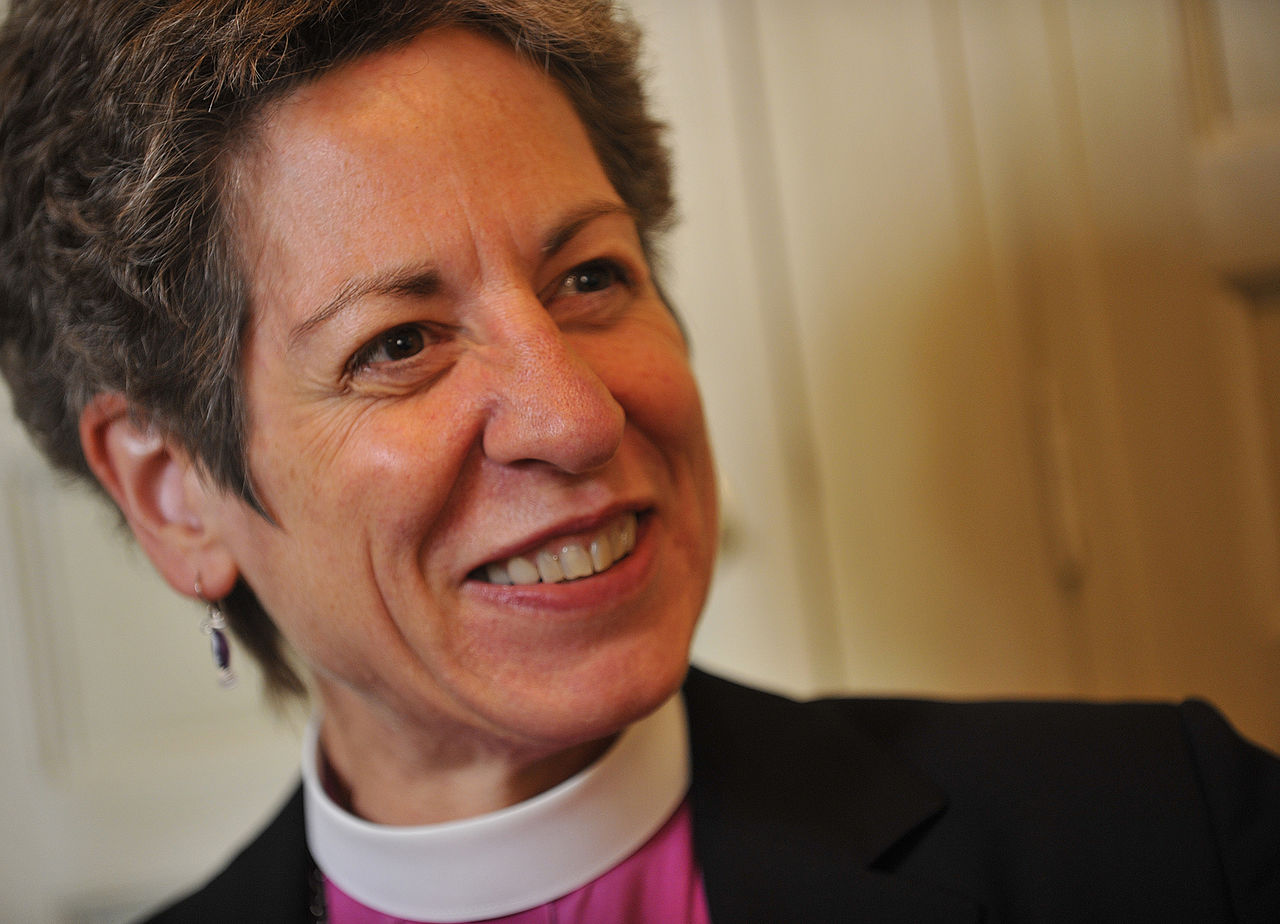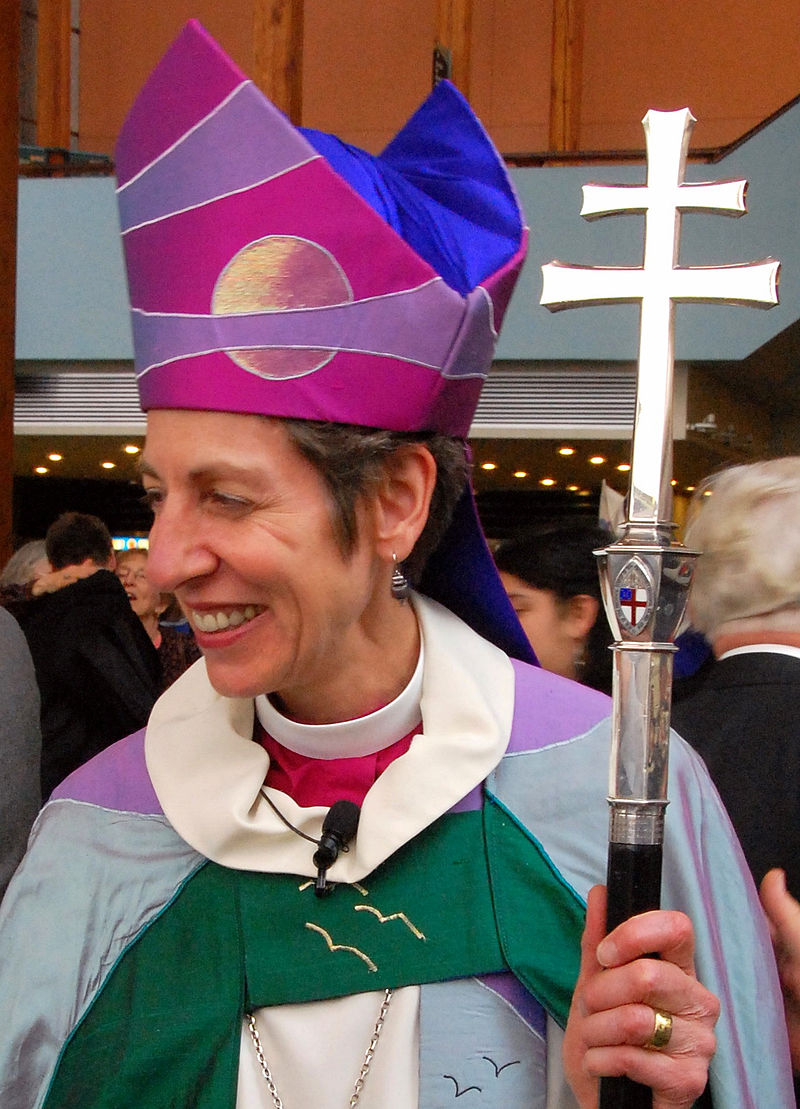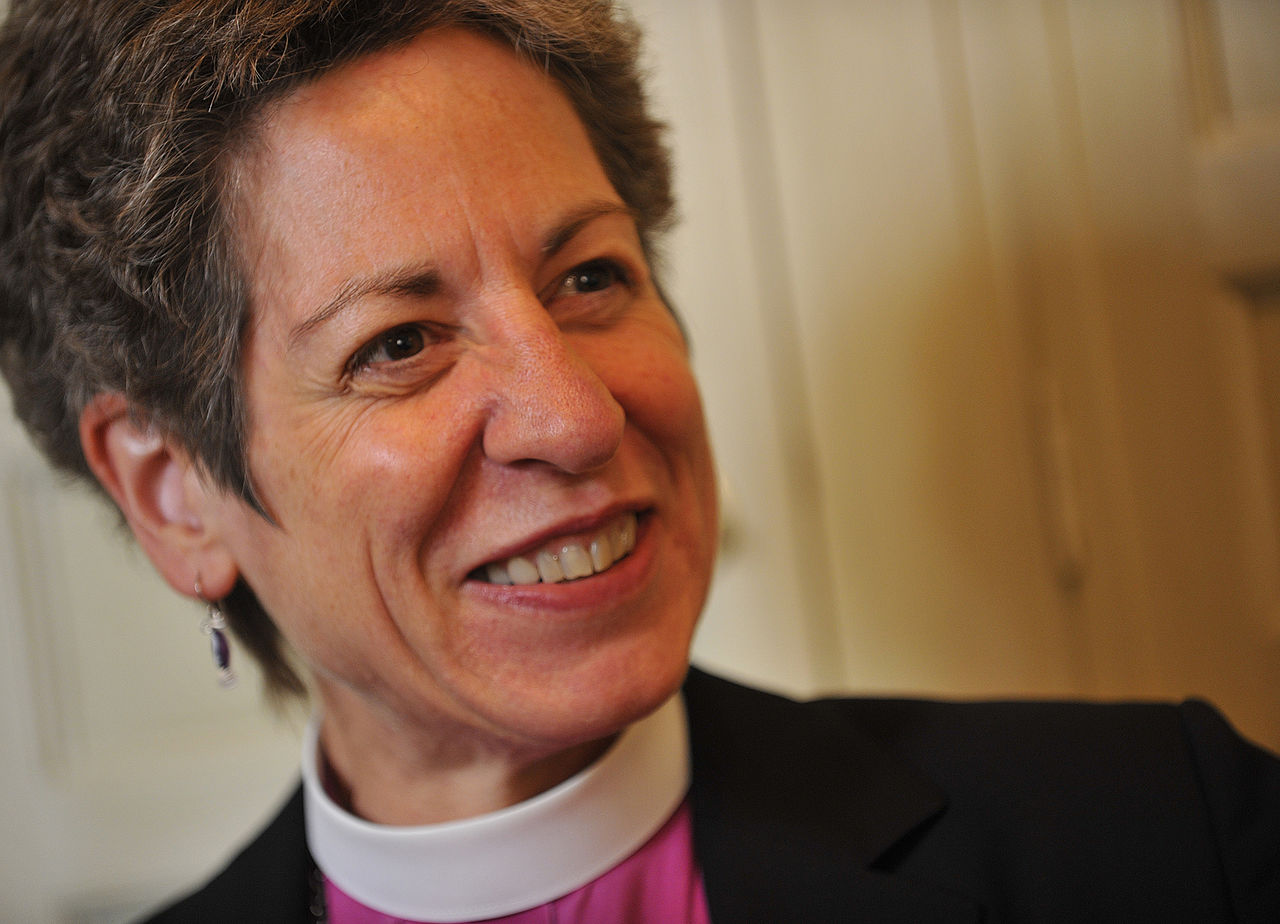
On Nov. 4, 2006, at a ceremony in Washington’s National Cathedral, Katharine Jefferts Schori became the presiding bishop of the Episcopal Church of America. Never before has a woman ascended to the role of primate or spiritual and executive leader in any province of the 77-million-member Anglican Communion. The 52-year-old Jefferts Schori, an experienced pilot who used to fly from diocese to diocese in her former role of Bishop of Nevada, took the controls of a church in turmoil over the ordination of the first openly gay Episcopal bishop, V. Gene Robinson of New Hampshire—and over the ordination of women.In her investiture sermon, as in many public statements before and since, she evoked Chapter 61 of Isaiah, which Jesus read from as his first public act.Isaiah is inspired by God to bind up the broken-hearted, to free the captives, to feed the hungry. The bishop, a former oceanographer, urged her listeners to make peace with those with different theological positions, to work to end poverty, to fund AIDS work in Africa— to find their true place in the world as they help others find their seat at the banquet table of life.
Jefferts Schori, who studied biology at Stanford before she earned a Ph.D. from Oregon State for her work on the evolutionary relationship of squids and octopuses, sought to help her divided flock see that they can begin to discover their true identity—their true home—as they give up self-centeredness to serve a larger body—the church—and, ultimately, creation. Some conservative dioceses are so upset by the consecration of a gay bishop and by Jefferts Schori’s liberal views on the matter, however, that they are poised to sever themselves from the Episcopal Church, seeking alternative leadership from the Archbishop of Canterbury, the nominal head of Anglican Communion.
Born into a Roman Catholic family and educated by nuns at a convent school until she was nine, when her parents began attending Episcopalian services, Jefferts Schori has maintained that real faith takes constancy and integrity rather than rigidity; that it means being faithful in the way that one is faithful in a relationship—vulnerable, willing to be changed by our encounter with another and with the deepest truth.
A scientist, the bishop believes in evolution. She believes that God’s creation and incarnation is ongoing, and that Christian faith must be the same—that there must a continual effort to open our hearts and minds, which can never happen just once for all time. Parabola met with Bishop Katharine (as she is called) in her offices in Manhattan to talk more about what it means to have faith.
—Tracy Cochran

PARABOLA: How has faith changed for you over the course of your life? How did you come to equate it with qualities like a willingness to be open?
BISHOP KATHARINE: You’re right in understanding that I don’t see faith as adhering to a list of propositions. I understand faith more in the sense of faithfulness in relationship. It’s filled with hope and expectation. It’s a dynamic relationship and if we’re stuck somewhere it means there’s more to do. That feeling of wandering in the desert or the dark night of the soul is a sign that something is germinating if we’re willing to have patience and suffer that darkness.
I understand faith in the sense of believing, and I understand it in the root sense of both the Latin and the English word that it’s what you give your heart to. It is engaging that which is more than oneself, that which calls the best out in oneself, the More.
It’s not always acknowledged in faith traditions that we’re meant to develop as human beings. We’re not meant as 40- or 50- or 60-year-olds to have the same faith we did as a child. For me, the deformation of some religious expressions is that they say, “We’ve got the truth and we don’t need to keep on moving.” The tension and the discomfort that comes with engaging a part of the world that says, “No, that’s not adequate” is where we grow. That’s where our faith develops.
P: The Anglican Communion is in turmoil about the ordination of a gay bishop, and you have been labeled liberal and pro-gay. What is your view?
BK: I’ve looked carefully at what’s in the Bible about it. There are some passages in the Old Testament that seem to say that this is inappropriate in the same context that it says that it’s inappropriate to wear clothing made of two kinds of fiber or to eat shellfish or to have sexual intercourse with a menstruating woman. They are purity codes. Christians have set many of these purity codes aside as culturally bound, deciding they aren’t truths for all ages. There are some references in the New Testament where translation issues become significant. We don’t have entire confidence about what certain words mean but they appear to talk about abusive and exploitative behavior—a Roman soldier keeping a boy as a servant whom he also uses for sexual purposes. We don’t see that as appropriate behavior. Nowhere in those passages is there anything about a mature committed relationship between people of equal power. There are some interesting stories about David and Jonathan and Jesus and his mostly male circle being on the road together. Jesus says absolutely nothing about issues that people see as homosexuality today.
I look at the scientific work that’s been done over the past hundred years–much of it in the last couple of decades—and it seems that while homosexuality doesn’t appear to be entirely genetic or entirely environmentally formed, orientation is fixed at a very early age, before what a person of faith would say is the age of reason.It’s not a conscious choice to go an aberrant way, as some are calling it.Therefore I think we have to see this as part of the way a person is created.
Then the job of faith becomes the same as it is for any other person, to ask how can you live a whole life given what God has gifted you with? How is the fullness of your being expressed and given to ministry in this world in a way that’s faithful? And I think that’s where the church has to engage. You may come to different conclusions about what faithfulness looks like. But does it contribute to abundance for the rest of creation? Or is it diminishing?
P: How can I begin to open up my heart and mind so I can really see if my views and actions contribute to abundance or diminishment? I want to be able to see reality and to love my neighbor but I get fogged in by selfish dreams and desires.
BK: Judeo Christian tradition has always said that wholeness, holiness, salvation, comes in the midst of community and the aberration is to say that I myself can understand, can just make my own decisions and go my own way. The Jewish tradition particularly says that salvation happens only in community, and that if we’re not all whole and healed then none of us can be. We have to study the tradition and how people have wrestled with these problems over the eons. We have to engage in community and get our rough edges rubbed off. We have to live in a way that isn’t anxious, understanding that the present is all we really have. How can we contribute to holiness and wholeness and healing in this very moment?
P: But how does a person keep from getting distracted by a demanding job—a demanding world? Jesus lived a very radical life. He was basically homeless. You’re not living a radical homeless life.
BK: Sometimes it feels that way. My husband is not going to move to New York, at least not any time soon. I will be on the road most of these next nine years. So in some sense home becomes where one is, and one has to find the connection to people and challenges and the call, in the moment.
P: One of the things that’s unique about being a Christian today is that one now co-exists with people of many different faiths. The body that we all have to be part of has to be the body of a very diverse world. So why be Christian?
BK: For me it is the way of knowing what holiness looks like in human form. Having been formed in this tradition, it’s the best image I have of what it means to live as the most abundant human being possible. Jesus came among us in to suffer and share with us the pain of human existence–and to say that God can always do something more with the worst that you can imagine.
I think we have an enormous amount to learn about our own tradition by confronting other traditions. The details and forms are quite different but there is a yearning for something beyond that is common, a human quest to be at home in something more.
P: Isn’t faith is a two-way action? Doesn’t it require participation to be in communion?
BK: It requires some investment. Otherwise it’s not communion. It’s simply observation. It requires vulnerability, the willingness to become what one eats and to be changed in that encounter. To say I will show up with my whole being and I will engage. And yes, we all may be changed in the encounter, and that can be a good thing.
P: Did coming to faith take suffering in your case?
BK: I think life on this journey is a series of losses, and we have to engage them and find resurrection in the midst of them.In my case, a childhood friend died in a plane crash, killing his wife and her parents.It did lead me back to church because I knew there was a faith community there that would help me wrestle with that.
I also spent a good chunk of my adult life becoming an oceanographer, and in the mid-80’s the federal research priorities changed. Suddenly it became impossible for me to continue doing the kind of work that I was doing. At the same time, three people in my congregation asked me if I’d ever thought about being a priest. There was a whole series of deaths. There was the death of a friend. There was the death of a dream that I’d spent fifteen years of my life working towards, the death of my self-definition, the death of a community in my field and in my lab. But out of that dark night came calls to do other kinds of things—to help get a Habitat for Humanity Chapter started, other philanthropic work. Finally, I was asked to preach right before the first Gulf War and I said yes to the call to be a priest five years later.
P: What does someone do when they believe that Jesus is divine but that some things that are defined as creeds—that Mary was a virgin, for example–don’t seem right? Can one still be a faithful Christian?
BK: I hope that’s an invitation to deeper encounter.One can begin to look at where those creeds came from and the traditions they drew on.Luke’s story about the virgin birth draws on a story in Isaiah that talks about a young woman who will conceive and bear a child and save Israel. Our post-Enlightenment insistence on utter definition detracts enormously from the mystery of faith.Again, those creeds are not about checking off a bunch of propositions.They are about giving our heart to a sense that Jesus shows us what it looks like to be a divine human being.
I don’t think they’re talking about parthenogenesis [reproduction from an ovum without fertilization, a normal process in some invertebrates and lower plants].
If you begin to explore the literary context of the first century and the couple of hundred years on either side, the way that someone told a story about a great figure was to say ‘this one was born of the gods.’ That is what we’re saying. This carpenter from Nazareth or Bethlehem—and there are different stories about where he comes from–shows us what a godly human being looks like, shows us God come among us. We have affirmed ever since then in this tradition that each one of us is the image of God. We are all the sons and daughters of God. I think there is an invitation to look below a superficial minimization to what the story are really about. It makes some people very uncomfortable to do that, I recognize.
P: You emphasize living the path and the truth that the scriptures are shot through with mystery. But isn’t the mystery closest at hand why it is so hard to get down to the essence of Christ’s teaching, to love one another and love God?
BK: Because we live in tension with selfishness. The question is always how can we get beyond our own narrow self-interest and see that our own salvation lies in attending to the needs of other people.
P: Is selfishness a biological inheritance? Is fallen-ness hardwired?
BK: A physiologist would point to some neuroanatomy and neurochemistry and say that when we’re threatened we retreat into our lower brain where the question is about survival. Our base instincts come from that. We defend ourselves against any threat. The human journey is about encouraging our own selves to move up into higher consciousness, into being able to be present in a threatening situation without responding with violence. That was the great teaching of Gandhi and or Martin Luther King Jr. They both said we will respond in a nonviolent way and it will change the world.
P: That’s faith in action.
BK: That is what practice is about. The scriptures say grow up into the full stature of Christ. Become less animal in the sense of instinctive response and more godly, more spiritual, not divorced from our flesh but capable of using it in service to a higher aim. ♦
From Parabola Volume 32, No. 1, “Faith,” Spring 2007. This issue is available to purchase here. If you have enjoyed this piece, consider subscribing. Four times a year Parabola has explored the deepest questions of human existence. Without your support, we would cease to exist. Please consider helping us by making a donation.
